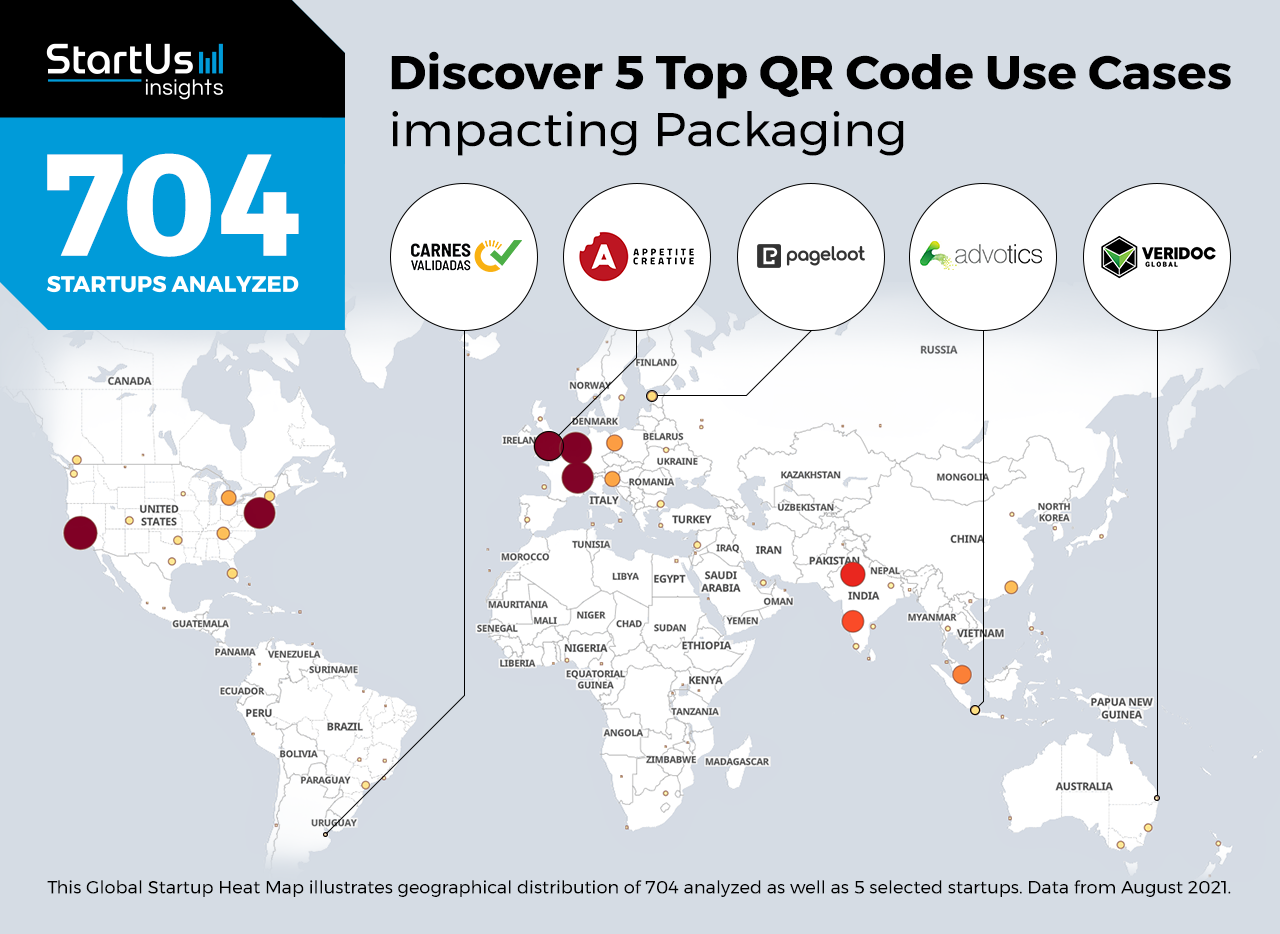Staying ahead of the technology curve means strengthening your competitive advantage. That is why we give you data-driven innovation insights into the packaging industry. This time, you get to discover 5 hand-picked QR code startups.
Global Startup Heat Map highlights 5 Top QR Code Startups impacting Packaging out of 704
The insights of this data-driven analysis are derived from the Big Data & Artificial Intelligence-powered StartUs Insights Discovery Platform, covering 2.093.000+ startups & scaleups globally. The platform gives you an exhaustive overview of emerging technologies & relevant startups within a specific field in just a few clicks.
The Global Startup Heat Map below reveals the distribution of the 704 exemplary startups & scaleups we analyzed for this research. Further, it highlights 5 QR code startups impacting packaging that we hand-picked based on criteria such as founding year, location, funding raised, and more. You get to explore the solutions of these 5 startups & scaleups in this report. For insights on the other 699 QR code solutions for packaging, get in touch.
Pageloot builds a Personalized QR Code Generator
Opening the packaging of a new product is often an exciting experience for consumers. This is why brands pay special attention to their products’ packaging and refine their designs regularly. Since businesses want to connect with customers beyond a single purchase, they turn to digital solutions such as AR-based or interactive packaging. To this end, startups offer QR code solutions for companies to enhance their packaging and promote their brands.
Pageloot is an Estonian startup that offers a personalized QR code generator for product packaging. The startup’s solutions are free to use and allow for editing QR codes after generating them. Moreover, companies gain insights into who scanned their QR codes along with the time and location stamps. These codes enable businesses to keep track of their marketing performance through QR scanning statistics.
Carnes Validadas enables QR Code-based Meat Traceability
Meat traceability is the result of a long series of advancements in food quality and safety management. It is recently gaining traction as a new quality indicator and trading platform. In sustainable agriculture, for example, traceability is an interdisciplinary idea that promotes verifiable transparency. To this end, startups promote sustainable agriculture by providing blockchain-based solutions for meat traceability.
Carnes Validadas is an Argentine startup that offers a traceability platform for meat producers. The startup facilitates traceability in the meat supply chain by creating an animal’s digital identity using blockchain technology. Through its platform, Carnes Validadas provides transparency and clarity into the meat production process, from genealogy to end-consumer data. This allows consumers from anywhere in the world to scan QR codes on meat packaging in supermarkets, butcher shops, or restaurants. The solution also works with existing management systems and tracks the meat value chain through the startup’s Validated Meats platform.
Advotics leverages QR Codes for Product Digitalization
Businesses today bring automation and data exchange to the production and distribution of goods. This is done through the use of scannable codes on the product or its packaging. Adding QR codes, radio-frequency identification (RFID) tags, or near-field communication (NFC) tags to physical objects allows brands to engage with customers and provide more information about their products. Startups offer sensor-embedded packaging solutions to convert data from offline work and trade activities into insightful metrics, in turn, helping businesses make data-driven decisions.
Indonesian startup Advotics develops a software-as-a-service (SaaS) solution for product digitalization. The cloud-based platform digitalizes physical assets and products using QR codes. This allows businesses to protect against cross-border sales and counterfeit products. It further allows brands to track product movement and inventory as well as personalize rewards and incentives campaigns. The QR codes printed on the product packaging helps brands track product distribution in real-time and identify unfair cross-border inventory dumping practices.
VeriDoc Global provides Anti-Counterfeiting Solutions
Counterfeit products result in significant losses for brands since fake replicas decrease their market value and brand reputation. Because counterfeit products are low-quality replicas, fraudulent products can be life-threatening for consumers, especially in the food, beverage, or pharma industries. Hence, startups leverage blockchain technology and QR codes to help brands identify and reduce counterfeit products.
VeriDoc Global is an Australian startup that offers track and trace solutions for the food and pharmaceutical industries. The solution involves embedding a QR code on a batch of items to create a unique digital hash inside the QR code. The hash holds a string of information that is secured on a blockchain network. This enables brands to easily verify and validate end-users. Moreover, the startup allows customers to scan products and verify the authenticity of the items using any QR code reader.
Appetite Creative offers Connected Packaging Solutions
Connected packaging is the integration of technologies into the design of the product packaging. This enhances user experience and increases product engagement as well as ensures GDPR compliance and first-party data collection. As a result, brands and companies are able to perform in-depth analyses of customers’ behavior. To this end, startups enable brands and companies to upgrade their packaging using technology as well as collect first-party analytics and boost sales.
British startup Appetite Creative develops a proprietary platform that enables enterprises to deliver business-to-consumer (B2C) marketing, implement connected packaging, and enhance customer engagement experiences. The startup designs creative campaigns and web apps that are accessed by scanning a connected package, QR code, or NFC tag. This allows brands to educate and engage their customers with interactive experiences and direct users to particular actions or campaign objectives.
Discover more Packaging Startups
Packaging startups such as the examples highlighted in this report focus on personalized packaging, food traceability, anti-counterfeiting as well as internet of packaging solutions. While all of these technologies play a major role in advancing the packaging industry, they only represent the tip of the iceberg. To explore more packaging technologies, simply get in touch to let us look into your areas of interest. For a more general overview, you can download our free Packaging Innovation Report to save your time and improve strategic decision-making.


![Packaging 4.0 : Top 9 Digital Transformation Technologies to Watch [2025]](https://www.startus-insights.com/wp-content/uploads/2025/02/Packaging-4.0-SharedImg-StartUs-Insights-noresize-420x236.webp)






